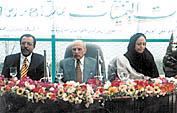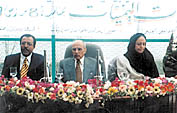
Observing The International Women’s Day in Yemen [Archives:2000/11/Reportage]
March 13 2000
By: Mohammad Bin Sallam
Yasser M. Ahmed
Yemen Times
Yemeni women celebrated the International Woman’s Day on March 8th in the Central Meeting Hall at the Ministry of Planning and Development. At the same time a number of meetings and different activities were conducted in different governorates by the offices of the Women Union within the international call to promote women’s participation in societies. Official newspapers were asked, on this day, to issue special supplements edited by women.

Dr. Al-Iryani began his speech be describing the 8th of March as a symbol for women and by conveying his greetings as well as the leadership’s greetings to all Yemeni women in rural, urban and desert areas.
He said that all societies were aware of the importance of women’s contributions to all sectors, pointing out to the Yemeni constitution which stipulates that women have equal rights to men in all fields of development.
He explained how women in the past were deprived of going to the Qur’an schools to acquire basic literacy, contradicting that situation with the present when there are holders of highly specialized academic degrees, practicing professions that were for long confined to men indicating that there is no field of development Yemeni women do not participate in. “We are not claiming here that Yemeni women have obtained all what they are aiming for but what has been achieved already is remarkable,” he added.
Moreover, he called upon families everywhere in Yemen, to educate their girls, improve their health and to stimulate their participation in the fields of development and economy.
He described women as the source of life, as well as caretaker and guide of generations. He highlighted the government’s commitment to promote women’s participation, including resolutions taken by the government last year concerning the establishment of general directorates for women in ministries, to support women’s participation and to meet their needs and interests and to improve the quality of life for women and guaranteeing their due rights.
In her speech, Mrs. Amat Al-Aleem Assoswa welcomed the guests and highlighted the glorious history of Yemeni women. Recalling the black history of the British colonization and the Imam’s regime during which women were the most suppressed and oppressed class, Assoswa expressed her happiness to what Yemeni women have achieved at the present time. However, ” Women still need more attention from the government, family and society in order to fill the gap between man and woman in many fields such as education, decision-making, etc.,” she added.
Ms. Joke Buringa, First Secretary Gender and Development, Netherlands Embassy Expressed her gladness at the recent revival of the gender task force under coordination of the National Women’s Committee. She explained how understanding of women’s needs and interests changed drastically and how women became no longer passive recipients of development but active participants. She further described the adoption by the General Assembly of the United Nations of the Convention on the Elimination of All Forms of Discrimination against Women (CEDAW) in 1979 as the most important achievement of the period.
A number of messages were also read on the occasion such as Koffi Anan’s, Mr. Boualem Aktouf, the UNDP Resident Representative, a. i., Mr. Mark Malloch Brown the UNDP Administrator and others.

Q: What does the 8th of March mean for you?
A: This day is one of our important days. All people at both the public and the official levels pay attention to woman affairs and conduct activities embodying women status and achievements in the society. We in Yemen give this day special meaning because it portrays attention paid to all in various fields and for me I am very happy in this day, and I feel that it is one of the days which are very close to our hearts as women.
Q: There are many calls and slogans on women’s rights, develop and upgrade their conditions and roles in society, how it is possible to achieve that, given the fact of having a biggest rate of illiteracy?
A: Yes, I agree with you in this point that there is big rate of illiterate people in our country especially among women, but women’s rights are stipulated in constitutions, laws, and the law of Islam. But the problem here is who would translate these laws into actual steps or rights actually granted. Illiteracy plays crucial roles in hindering our role as women in getting our rights. In addition to this, our traditions and customs represent the essential obstacle. The man also does not support women to get their rights. The fourth reason is related to the educated women themselves because they do not join hands with illiterate women. They are existent, but there is no awareness among people. I think if women and men join their forces for creating awareness of these rights, they can achieve some good leaps in this regard.
Q: I have asked a woman, a chief editor of a newspaper for an interview, but her husband refused to allow me to picture her, what do think of that?
A: This is an individual stance, so we must not involve on this matter. In my opinion, I see that while the woman works as a journalist, she must be free. On the other hand, woman must interact with man in all subjects, especially in the press field.
Q: In our society, few women are involved in political activities, how do you explain that?
A: The fact is that people think wrongly of women. They think her incapable of managing her own affairs, how then could she take care of others’! This unrealistic opinion about women’s capabilities is the outcome of illiteracy and lack of awareness of their rights. A woman could be educated and holding high degrees but not having a degree of awareness and thus could not change the mode of her life and personality. Education could facilitate for her to get a job but to be a leading figure in the society is what her real suffering is in our country. The difference between the educated and illiterate woman is that the educated woman believes she must not subordinate to man, while non-educated woman does not take such a stand.
Q: Are you married?
A: No, I am not married, but I hope that I will get married to someone who could understand me well.
Q: Don’t you believe that women are in need of men?
A: No, a woman is in need of a man, life can not be complete without a man. She is need of a man who would stand by her and guide her if she has done something wrong but not to treat her in a harsh way.

Q: What does the 8th of March mean to you?
A: It means many things for me. It means struggle for the sake of women’ causes.
Q: There are many calls and slogans on women’s rights, develop and upgrade their conditions and roles in society, how is it possible to achieve that, given the fact of having the biggest rate of illiteracy?
A: We have to put an end to illiteracy among women because women could not be developed if they are illiterate, essentially they are unaware. This is their actual problem. The other point is that if decision- makers grant us these rights we can then develop ourselves. But if those in power and decision-making do not grant women their rights there would not be any use because all these can be obtained through laws. That why I told you of the need of continued struggle, it is very difficult situation and we have a long way to go.
Q: How can equality between the woman and the man be achieved, and in what fields?
A: I do not believe that there is something is called equality. There is a need called giving equal opportunities to both man and woman. It was said the proper man in the proper place and now I say the proper woman in the proper place.

Q: What does the 8th of March mean for you?
A: This day is a great day because it has chronicled women’s struggle for their legitimate rights all over the world. On this day we recall when women workers in a textile factory in the U.S. city of Chicago launched their uprising in late 19th century, demanding their rights to working hours equal to those of their male colleagues. Women workers were doing longer hours with half wages compared to those paid to men. That date represents a distinguishable turning-point in the history of woman’s struggle. Today we are celebrating the International Women’s Day by all public and private sectors institutions in Yemen for the first time under the state of unity. This ceremony marking the Day is considered a remarkable gain for Yemeni women. In addition, the ceremony of honoring Yemeni female journalists is ushering a forward stand for women. Two or three years ago men even abstained from mentioning the 8th of March as a Day for women. This is an indication that Yemeni people started to comprehend the role of women in the development process. We are now working to establish the relationship with men in all fields. Men should realize that they are not the only owners of decisions, but they have to share women because women are now present and active in all Yemeni universities and entering all walks of life.
Q: There are many calls and slogans on women’s rights, develop and upgrade their conditions and roles in society, how is it possible to achieve that, given the fact of having the biggest rate of illiteracy?
A: Suppose there is 75% of illiterate men and women in Yemen, in this case the state should take the responsibility of illiteracy eradication. The state should work for eradication of all sorts of illiteracy not only of reading and writing. There is a mutual ignorance and misunderstanding of the relationship between man and woman. Regarding the development process, man is considered as a self-reliant productive force. So, women’s effort and role is devoted to produce certain other things. For example, women in rural areas shoulder the responsibility of caring for their houses and families, this means that women should not acquire other significant positions or play more important role. Man should not believe that he is the one and only master of the household. How can we find developing programs and projects for women that enable participate in the development process. In addition to this, how can women get their rights through the different syndicates available all over the country while they are out of their activities. There is a missing link in women’s work and this is the reason behind her inability of playing a vital role in development.

The International Women’s Day is very important occasion. It represents people recognition of women’s achievements. Women have been deprived of their rights for generations owing to old traditions and concepts. These traditions and concepts are utterly not related to the religion of Islam. Islam has honoured women and gave them a high status in the society. It does not stipulate unjust social differences between man and woman.
Numerousness of slogans and calls in favour of women and their status and rights are nor not important as the serious action towards upgrading her conditions. This can be achieved through studying women’s affairs and give them opportunities to show their abilities and skills. Women constitute half of the society and they are capable of sharing men in building and developing the society. The most significant factor in this respect is the work for educating women and let them be active member capable of accomplishing the development of society on equal footing with men.
——
[archive-e:11-v:2000-y:2000-d:2000-03-13-p:./2000/iss11/report.htm]


